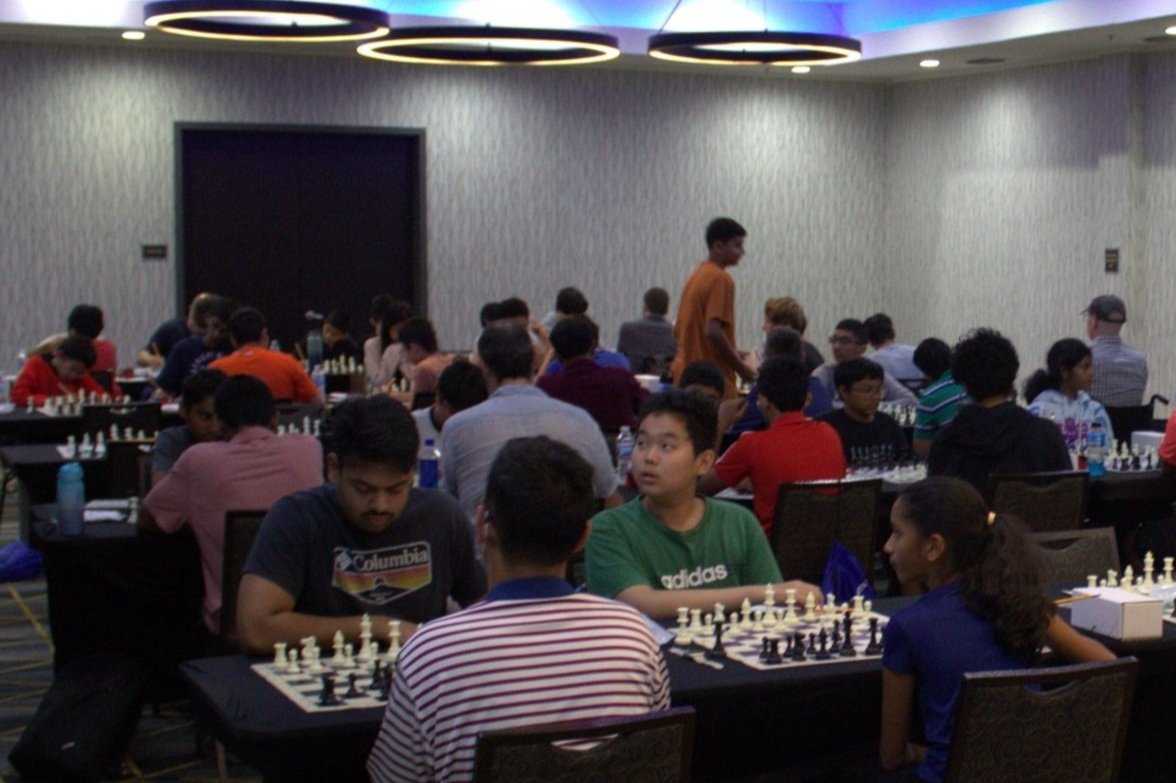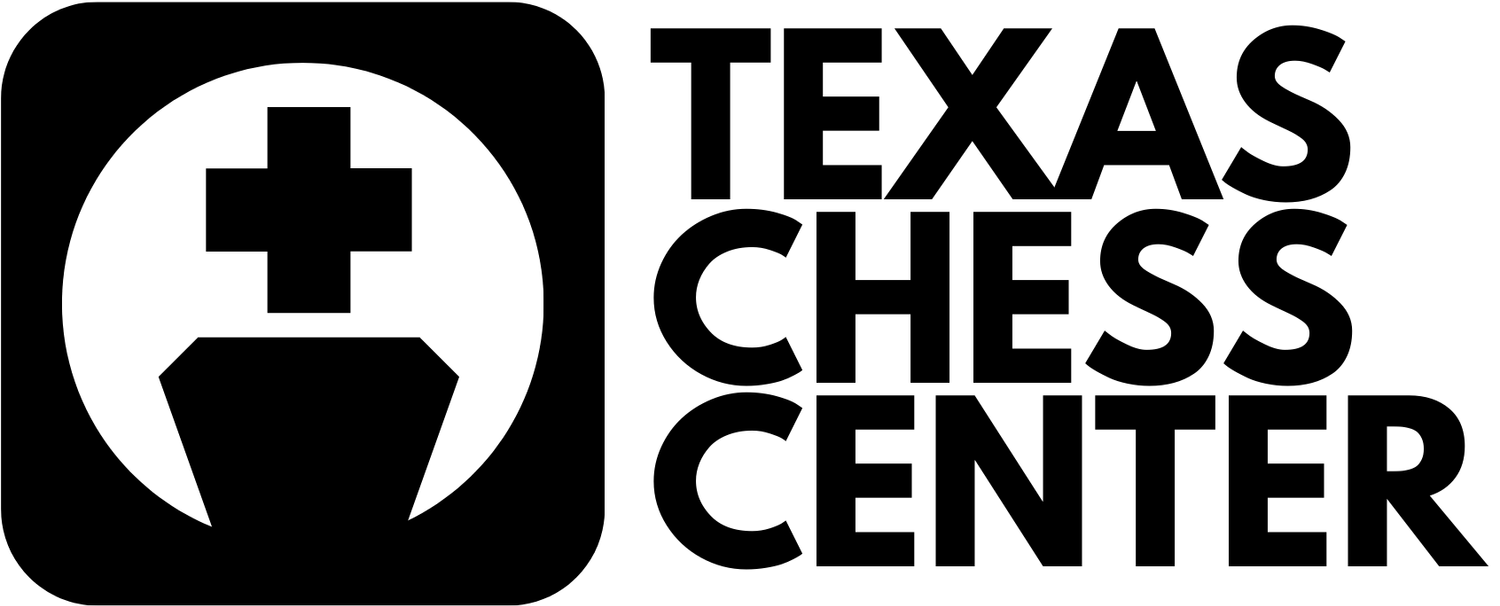
Tournaments
We host a variety of chess tournaments across Texas, primarily using the Swiss format. Our weekly tournaments are a favorite among casual players, offering a relaxed and enjoyable atmosphere. For those seeking a more competitive experience, we also organize scholastic events, championship matches, and FIDE-rated tournaments that provide serious challenges and opportunities for growth.
Events by Category
Rules
-
Touch-move rules are in effect. If you touch your piece, you must move it; if you touch your opponent’s piece, you must take it.
-
If you want to adjust a piece, say the words “I adjust” BEFORE touching it.
-
On your turn, please press the clock with the same hand you moved with, AFTER moving your peice.
-
Keeping notation is not required in the <beginner> sections, and is not required for either player if you or your opponent gets below five minutes. (If time control has a 30-second increment or more: Scorekeeping is required EVEN IF either player falls below five minutes.)
-
Do not walk into a tournament hall while games are in progress if you need an item to be dropped off to a participant. Kindly ask a Tournament Director and they will take the items to the player.
-
Here is a list of common penalties:
Addition of 2 minutes to the opponent's clock
Reset to previously notated position
Removal of half remaining time up to 10 minutes
Automatic loss of game
Removal from round
Removal from tournament
1 Month ban for all TCC Tournaments
6 Month ban for all TCC Tournaments
1 year to life-long ban of all TCC Tournaments
-
In the event of any claims, pause the clock with the center plastic button and come find a TD.
-
When you’re done with your game, reset the pieces and mark your result, on the same sheet where you found your pairings in the first place. 1 for a win. 0 for a loss. ½ for a draw.
-
Cell phones must be placed face down on the table, visible to both players, and turned off. Apple Watches, smart watches, and other wearable tech must also be placed face down.
-
If you need to use the restroom, leave your device(s) on the table. If you need to go to the bathroom during your game, you may not pause the clock. You can go during your opponent's move, but once they hit the clock you will lose time.
-
Spectating is not permitted after your game has concluded. You must leave the tournament hall, close the door behind you, and record the results on the pairing sheet. Communication between spectators and players is prohibited once the game has started. Any form of outside assistance may result in severe penalties.
-
To withdraw from a tournament, please email info@texaschesscenter.com or complete the form on our website at least one hour before the event's start time. Refunds are available if requested up to one hour prior to the tournament's start. Refund requests made after this time will not be honored.
Information
-
You DO NOT have to bring anything. We provide notation sheets, pencils, chess boards, and clocks. It is recommended that you bring water bottles. We have snacks and drinks for sell onsite.
-
Inform us as soon as possible if you cannot play a round. Half-point byes are available if requested before the start of the preceding round. If not requested in time, the bye will be worth zero points.
If there’s an odd number of players, then someone has to sit out. You’ll still get a win in the tournament, but no ratings change. Byes are given to the lowest-scoring player in the section, with the exception of players for whom it’s their first tournament or players who have a scheduled zero or half-point bye coming up. Refunds are not given or expected for byes. -
You may request to compete in a higher section for an additional fee if you meet the criteria below.
A): Your monthly USCF rating is within 150 points of the section’s cutoff. Example: If the cutoff is 1600, a monthly rating of 1450 qualifies (150 points below 1600), but 1449 does not.
B): Live Rating Fee Waiver: If your live rating is above the cutoff (even on the event day), the playing-up fee is waived or refunded.
C): Provisional Players (<25 games): If your monthly rating is below the 150-point range, but your live rating is above it, we average the two ratings. If this average is still below the cutoff, you cannot play up.
D): FIDE Rating Conversion: Players can play up to the next section if their US Chess Rating is within 150 points of the next section. Players may also use their FIDE rating after converting it into a USCF using the following formula. US Chess rating = ( 180 + 0.94 × FIDE if FIDE ≤ 2000) OR (20 + 1.02 × FIDE if FIDE > 2000) -
If you're familiar with the rules and have an active US Chess ID, you're eligible to participate! Players of all ages and skill levels are welcome, with participants ranging from 5 to 99 years old.
-
Initial Registration must be done on our website. The registration deadline for the tournament is 30 minutes before the scheduled start time. Players who register after this cutoff may receive a bye for the first round. Refunds are available 1 hour before the tournaments; no refunds for no-shows.
-
In the first round, players are ranked by their monthly rating. The top half competes against the bottom half. In subsequent rounds, winners face off against each other, as do the losers. This pattern continues throughout the tournament. There is no elimination in swiss style tournaments.
-
Refunds are available up to 1 hour before the tournament begins. Late withdrawal requests will not be refunded. To withdraw from a tournament, please send an email at least one hour before the event's start time.
Missing a tournament without notice results in a warning for the first offense and a subscription suspension for the second. No refunds for missed tournaments.
-
Among median tiebreak methods, this approach is widely used. It evaluates a player's competition strength by summing the scores of their opponents. Players with an even number of wins and losses discard both the highest and lowest opponent scores. Those with more wins discard the lowest score, while those with more losses discard the highest. In tournaments with nine or more rounds, the top two, bottom two, or all four scores are omitted, depending on the player's win/loss ratio. Unplayed games are counted as half a point each. If a tied player has unplayed games, those are treated as games against opponents with a score of zero.
-
In the United States, a player obtains a chess rating through the United States Chess Federation (USCF) by participating in rated tournaments. After playing and completing 4 games against other rated opponents in a sanctioned event, the USCF uses the results to calculate an initial rating for the player called a “Preliminary Rating”. This rating fluctuates as one continues to play in rated events, reflecting their performance relative to other players. In addition to the rating, players are assigned a unique US Chess ID, which helps in tracking their progress, tournament history, and rating adjustments over time. After 25 total rated games, they will receive their “Established Rating” which fluctuates less often.
-
FIDE-rated tournaments differ from US Chess-rated events in their rating systems and international scope. FIDE uses the Elo system globally, while US Chess focuses on American players. To get a FIDE ID, play in a FIDE tournament and complete the registration form. We’ll handle the rest.
Alternatively, you can request from USCF directly. To be officially FIDE-rated, you must play five games against rated FIDE players, score at least half a point, and achieve a performance rating of at least 1400.




